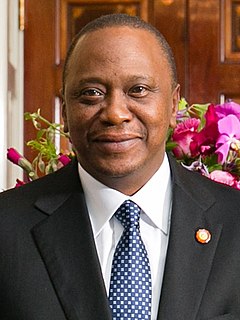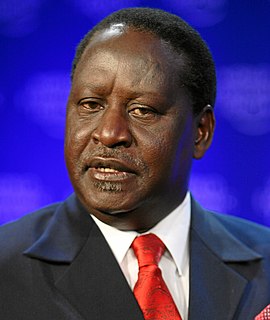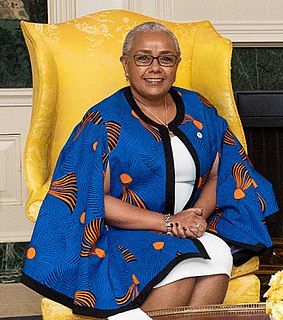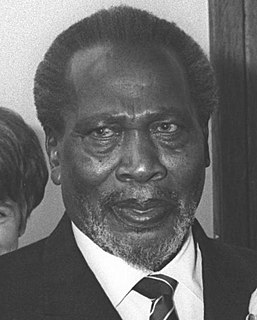
The Kenya African National Union (KANU) is a Kenyan political party that ruled for nearly 40 years after Kenya's independence from British colonial rule in 1963 until its electoral loss in 2002. It was known as Kenya African Union (KAU) from 1944 to 1952.KAU was banned by the colonial government from 1952 to 1960.It was re-established by James Gichuru in 1960 and renamed to KANU on 14 May 1960 after a merger with Tom Mboya's Kenya Independence Movement.

The President of the Republic of Kenya is the head of state and head of government of Kenya. The president leads the executive branch of the Government of Kenya and is the commander-in-chief of the Kenya Defence Forces. The official residence of the president is at State House, Nairobi. The wife of the President is referred to as the First Lady of Kenya.

Uhuru Muigai Kenyatta is a Kenyan politician and businessman who is the fourth and current President of the Republic of Kenya. He served as the Member of Parliament (MP) for Gatundu South from 2002 to 2013. Currently the party leader and a member of the Jubilee Party of Kenya, he was previously involved with The National Alliance and before that the Kenya African National Union.

Raila Amolo Odinga is a Kenyan politician who served as Prime Minister of Kenya from 2008 to 2013, and has served as Leader of the Opposition since 2013. He was Member of Parliament (MP) for Langata from 1992 to 2013. He served in the Cabinet of Kenya as Minister of Energy from 2001 to 2002, and as Minister of Roads, Public Works and Housing from 2003 to 2005. Odinga was appointed High Representative for Infrastructure Development at the African Union Commission in 2018.
The Kiambu Mafia is a pejorative term referring to a small group of the Kikuyu people primarily from the then Kiambu District of Kenya who benefited financially and politically from Kenya African National Union (KANU) and Kenyatta taking power at independence.

Ramogi Achieng Oneko (1920–2007) was a Kenyan freedom fighter and a politician. In Kenya, he is considered as a national hero.

The Government of the Republic of Kenya (GoK) is the national government of the republic of Kenya which is composed of 47 Counties, each county with its own semi-autonomous governments. The national government is composed of three arms: the legislature, the executive and the judiciary. Each arm is independent of the other and their individual roles are set by the Constitution of Kenya. The full name of the country is the "Republic of Kenya". Its official Swahili name is 'Jamhuri ya Kenya'. Other terms such as GoK, GK and Serikali are popularly used to refer to the Kenyan government.

General elections were held in Kenya on 6 December 1969, the first since independence in 1963. The country had become a de facto one-party state after President Jomo Kenyatta had banned the Kenya People's Union on 30 October, with Kenyatta's Kenya African National Union being the sole party to participate in the election. Although the post of President of Kenya was due to be elected at the same time as the National Assembly, Kenyatta was the sole candidate and was automatically elected without a vote being held.

General elections were held in Kenya on 14 October 1974. At the time, the country was a de facto one-party state with the Kenya African National Union being the sole party to participate in the election. 740 KANU candidates stood for the 158 National Assembly seats, with 88 incumbents defeated. Voter turnout was 56.5%. Although the post of President of Kenya was due to be elected at the same time as the National Assembly, Jomo Kenyatta was the sole candidate and was automatically elected without a vote being held. Following the election, a further 12 members were appointed by President Kenyatta.

The International Criminal Court investigation in Kenya or the situation in the Republic of Kenya is an ongoing investigation by the International Criminal Court (ICC) into the responsibility for the 2007–2008 post-election violence in Kenya. The 2007–2008 Kenyan crisis followed the presidential election that was held on 27 December 2007. The Electoral Commission of Kenya officially declared that the incumbent President Mwai Kibaki was re-elected; supporters of the opposition candidate Raila Odinga accused the government of electoral fraud and rejected the results. A series of protests and demonstrations followed, and fighting—mainly along tribal lines—led to many deaths, injuries and displacements.

General elections were held in Kenya on 4 March 2013. Voters elected the President, members of the National Assembly and new Senate, as well as County Governors and Representatives. They were the first elections held under the new constitution, which was approved in a 2010 referendum, and were also the first run by the new Independent Electoral and Boundaries Commission (IEBC).

The First Lady of Kenya is the title held by the wife of the President of Kenya. The country's present First Lady is Margaret Kenyatta, wife of President Uhuru Kenyatta, who took office on 9 April 2013.
Joseph Martin Shikuku was a Kenyan politician.
The inauguration of Uhuru Kenyatta took place 9 April 2013. Kenyatta won 50.07% of the vote in the 2013 presidential election.

General elections were held in Kenya on 8 August 2017 to elect the President, members of Parliament and devolved governments. The reported results indicated that incumbent President Uhuru Kenyatta was re-elected with 54% of the vote. His main opponent, Raila Odinga, refused to accept the results and contested them in the Supreme Court.

The presidency of Daniel arap Moi began on August 22, 1978, when Daniel arap Moi was sworn in as the 2nd President of Kenya, and ended on December 30, 2002. Moi, a KANU party member, took office following the death of the then president Jomo Kenyatta on the same day. He was sworn as interim president for 90 days during which the country was to prepare for a presidential election to be held on 8 November. Moi won reelections in 1988, 1992 and 1997, defeating Mwai Kibaki in the latter two elections. He was succeeded by Mwai Kibaki in 2002.

The presidency of Jomo Kenyatta began in December 12, 1964, when Jomo Kenyatta was named as the 1st President of Kenya, and ended on August 22, 1978 upon his death. Jomo Kenyatta, a KANU member, took office following the formation of the republic of Kenya after independence following his efforts during the fight for Independence. Four years later, in the 1969 elections, he was the sole candidate and was elected unopposed for a second term in office. In 1974, he was re-elected for a third term. Although the post of President of Kenya was due to be elected at the same time as the National Assembly, Jomo Kenyatta was the sole candidate and was automatically elected without a vote being held. He died in August 22, 1978 while still in office and was succeeded by Daniel arap Moi.











